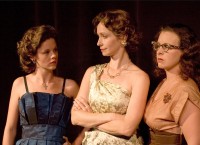Tulane’s theater festival is much ado about something
 The Shakespeare Festival at Tulane is celebrating its 16th season between May 28 and July 25, bringing the metropolitan area the opportunity to enjoy professional productions of Shakespeare’s works at affordable prices. The festival was founded by Ron Gural, Buzz Podewell, Paul Schierhorn and Jeanne Button, all of whom were Tulane University Theatre and Dance faculty members at the time. In addition to its high school training program, the festival will present King Lear (May 28–June 13) and The Comedy of Errors (June 25–July 11).
The Shakespeare Festival at Tulane is celebrating its 16th season between May 28 and July 25, bringing the metropolitan area the opportunity to enjoy professional productions of Shakespeare’s works at affordable prices. The festival was founded by Ron Gural, Buzz Podewell, Paul Schierhorn and Jeanne Button, all of whom were Tulane University Theatre and Dance faculty members at the time. In addition to its high school training program, the festival will present King Lear (May 28–June 13) and The Comedy of Errors (June 25–July 11).
Recently, New Orleans Living spoke with Ron Gural, co-founder and artistic director of the festival. Gural was born in New Jersey, grew up in Houston and got his master’s degree at Connecticut’s famed Yale Drama School. After school, he lived in “a run of places,” settling for a while in Milwaukee. There, he taught theater and co-founded the experimental group Theatre X, whose members included Willem Dafoe. In 1978, he interviewed for a job at Tulane, and it changed the course of his life. “It was just before Mardi Gras and the weather was nice, and I thought, ‘What am I doing living in Milwaukee?’ So I came to New Orleans.” He has taught, acted, directed and lived here ever since.
What led you to found the Shakespeare Festival?
We had a professional summer theater called Tulane Center Stage before that. That was founded before I got to Tulane, but I took over as artistic director of that at some point. I thought we needed to go in a different direction . . . . The four [co-founders] all liked doing Shakespeare, and we decided to do a Shakespeare festival. I had been involved with Shakespeare festivals in the past, and I thought we should try it here.
People have asked you how you keep Shakespeare fresh. There are so many ways theater companies manage to do that: setting the plays in different time periods and changing the setting. One of the biggest hits in New York right now is a revival of West Side Story, and of course that’s a retelling of Romeo and Juliet.
Shakespeare’s always relevant to whatever is going on because basically he wrote about human behavior. He had such great insight into human behavior—obviously, because those plays have lasted so many years.
Last year, you chose plays that focused on the battle of the sexes. What is the overarching theme of the productions this year?
This year we’re looking at the idea of perception. In both plays, people perceive something to be other than what it really is. In the case of King Lear, this results in tragedy. In the case of Comedy of Errors, there are comic misperceptions.
In King Lear—and in all of Shakespeare’s plays—the viewer or actor has to figure out what motivates the characters. There’s a lot of room for interpretation in that respect.
You always have to interpret in those plays. In a sense that’s true of any play. There are some playwrights who tell you a lot more than others, but a play is basically a blueprint for building your play, and there always is going to be room for interpretation. If you have the playwright around, you can ask him or her what something means. [Laughs] Obviously, with Shakespeare, you can’t ask him.
You’re co-directing King Lear with Jim Fitzmorris.
We co-directed last year, too. We did Taming of the Shrew for the festival. We’ve also co-directed [on numerous other occasions]. We work together pretty well. Also, I did some co-directing a number of times in Milwaukee at Theatre X. Of course, that was back in the 1960s, when everyone was into communal decisions. [Laughs] Sometimes there were three or four directors. Which sometimes worked and sometimes drove people crazy. With two directors, though, I think you’re okay.
You’re also an actor. How does that help you as a director?
I think I know how to talk to actors about what needs to be done, because I’ve been in their place. I know what the problems can be and know ways in which to solve them. I think like an actor quite often, though when I direct I’m also thinking like a director.
How do you maintain and build a base of support for the festival?
We have a subscriber base that supports us every year, but you never know what will happen in a given year beyond that. It’s not where we would like to be yet, but our audience grows every year and hopefully we’ll get there. The big skeleton in the closet right now, of course, is the state of the economy. But we’re going to do some pay-what-you-will performances, so that people of all income levels can come. There are also student and senior discounts.
Do you plan to branch out beyond Shakespeare productions in the future?
We’re not going to do it this year, but next year we’re talking about doing an original piece based on a historical incident that is related to a Shakespeare play. The idea would be to do the related Shakespeare play and the original piece next season. And, ultimately, we may explore other classics. Shaw, Ibsen, Moliere, who knows? Ultimately, we would like to go in other directions. Never to go away from Shakespeare. We’re always going to do Shakespeare.
